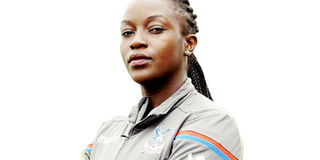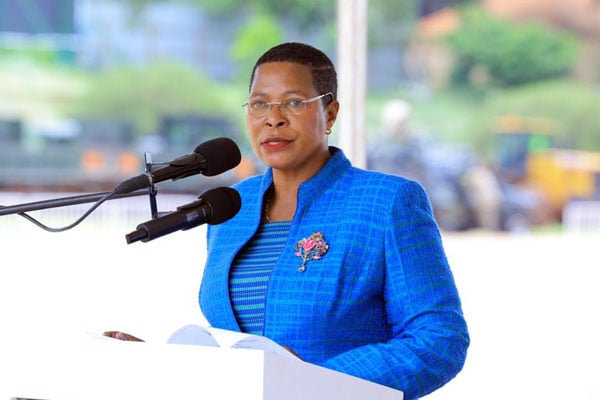Jean Sseninde using career for social good

Jean Sseninde
What you need to know:
Trailblazer. More than 10,000kms from her roots in Kampala, Sseninde is a modern pioneer a true trailblazing in the world of professional football. Jean Namayega Sseninde, who learned how to play in the muddy streets of Kasangati, now plays on world class turf. She now hopes the adventure will continue for many years to come, writes, George Katongole.
Being a professional footballer in Europe is a dream for several Ugandans let alone girls. But the feat did not come on a silver platter for 26-year-old Jean Namayega Sseninde, Uganda’s only professional female footballer.
“In football, you cannot do it alone. You need a team around you. That is the same thing about life,” she says.
Less than ten female players: Ritah Kivumbi, Sandra Nabweteme, Shadia Nandaula, Laki Otandeka, Joan Nakirya, Sandra Nantumbwe and Yudaya Nakayenze ply their trade abroad.
All those are actually semi-professionals who have earned scholarships in different colleges mostly in USA. Therefore Sseninde remains the only known woman making a living off her ‘blood and sweat’ - at Queens Park Rangers (QPR)in the FA Women’s National League South.
Sseninde has returned to QPR, a team she had left at the end of 2017 to join Charlton. She is used to the sort of circuitous journey in a country she says gives women football a priority.
Born in Kasangati and raised by Zephaniah Kizza and Rosemary Nansubuga Sseninde, she was interested into football by a group of boys that used to visit their home to play with her brother.
“At first they never let me play but the longer I sat on the sidelines, the more interested I became. We used to make footballs ourselves from banana fibre and empty milk packs,” she recalls.
Off the blocks
She did not play until she joined Gayaza High School. However, like most children in Uganda, at the lower stages of education, she played every sport. “But I never gave myself any chance to excel although I was good at tennis.”
Moving to St Mary’s SS Kitende was a stepping stone in her career as she was among the last female footballers before the school abolished women’s football. She later moved to England.
By playing in England, she earned her first national team call up during the Cecafa Women Championships in 2016 when Majidah Nantanda, who was the head coach, included her in the team that finished fourth.
Although her career highlight was winning the district championship twice with Kitende as captain in 2011 & 12, she recalls the national team call-up with pride. “We are making baby steps but I am happy we are headed in the right direction. Coming to play with a selection of the best players across the country re-assured me that we shall get there one day.”
Although her mother was interested in her in becoming a human resource professional, she supported her daughter’s dream.
“I had really done so well at Kitende and she was happy to support me. I have now completed my badges in coaching. But that is just one of the opportunities football can open for you. It is about commitment. Obviously football calls for peak performances. This is something you have to work for. It is a short career but very interesting because it is more than a game.
Social good
Like many professional players abroad, Sseninde turned every moment into opportunity. She was the first African to pledge one per cent of her salary to charity through Manchester United midfielder Juan Mata’s Common Goal initiative. It was a significant advantage to help her promote her brainchild, the Jean Sseninde Foundation.
“When I saw Common Goal for the first time on Instagram it triggered off something in me, because the description in the bio already showed me that this is a movement that I wanted to be a part of. We had a simila vision and I realised that this time, I did not have to do things alone, I could be part of a group of people and then together we could make a difference to so many others. And this time I was not changing people’s lives in just Uganda, but the whole world. For me, with Common Goal there was no second guessing, it was like the puzzle had clicked into place when I heard about Common Goal.”
Sseninde started her foundation with the help of her mother years earlier, although it came to life in 2016. To promote her charitable works, she started a football gala in 2016. She looks back at the success with pride.
“There have been a lot of exciting moments but the tournament is one of the platforms where several players get various opportunities in universities and schools. Some of them get selected for the women’s top league. This motivates me to keep organising these tournaments.”
Sseninde has been in Uganda since December nursing an injury but she has used the time to continue working on her project work. Her aim is to ensure young girls can get opportunities through sport.
“There are many young people who are just ignored by society but through football are integrated into that society and find a future. It inspires them to be someone in life and convince them that they can create a sustainable livelihood out of their own skills.
The foundation has three branches with one focusing on skills training with a view to enabling unfortunate youngsters to start their own small businesses. The second concentrates on sport and health, giving girls the chance to play sport in the community. The third helps to provide bursaries allowing those who would otherwise not get the chance to go to school to do so.
“Some things feel like they are normal neccesities everyone should have,” she says. “Yet that is not the case here.”
Burden of a role model
This is a special status for her and with open hands, she accepts the responsibility that comes with being a role model just at the time she should be enjoying her life.
“I like being a voice for others and I feel it is up to me to make a difference.”
But there is still some stereotypes surrounding women football in Uganda yet her ambition is to extend beyond the playing careers of the players and she plans to continue funding the cause with part of her salary. She knows her roots. Her family could have been affluent, but she never got access to trained coaches, this is a problem that kills most sportspeople’s dreams. Sseninde’s own journey has finally reached a period of stability in England. She has found new comforts in England, the only downside being that she misses her family while away.
“I love playing with a purpose to help my people. There is nothing better rewarding than waking up to do what you want to do with a cheerful heart,” Sseninde shares with a smile that lights up her face.
Need for change
However, women’s football in Uganda is still on a small scale. The national team, Crested Cranes, plays sparingly and last had action in the invitational Cosafa Women Championships last September. Competitively, they last played in the CECAFA Women Challenge Cup in July 2018. Some players have the benefit of playing in the Fufa Women Elite League, others in the regional leagues while the rest are absorbed in the school system that benefits from the Under-17 Airtel Rising Stars tournament.
“What impresses me is that the desire and passion to play is there. But there are a lot of barriers with some parents still having reservations about girls playing football.” This is a challenge she faced head-on as she used to train with boys. “Some people thought I was a spoilt girl but my burning desire and the support I received from my parents kept me going.”




